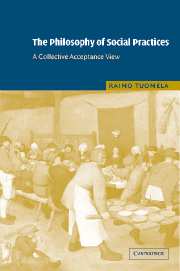Book contents
- Frontmatter
- Contents
- List of figures
- Acknowledgments
- Introduction
- 1 Collective intentionality and the construction of the social world
- 2 Collective intentionality
- 3 Conceptual activity, rule following, and social practices
- 4 An account of social practices
- 5 A Collective Acceptance account of collective-social notions
- 6 Social institutions
- 7 Social practices in a dynamic context: a mathematical analysis
- Epilogue
- Notes
- References
- Index
5 - A Collective Acceptance account of collective-social notions
Published online by Cambridge University Press: 22 September 2009
- Frontmatter
- Contents
- List of figures
- Acknowledgments
- Introduction
- 1 Collective intentionality and the construction of the social world
- 2 Collective intentionality
- 3 Conceptual activity, rule following, and social practices
- 4 An account of social practices
- 5 A Collective Acceptance account of collective-social notions
- 6 Social institutions
- 7 Social practices in a dynamic context: a mathematical analysis
- Epilogue
- Notes
- References
- Index
Summary
INTRODUCTION
Many social properties and notions are collectively constructed. Some rather obvious, broadly factual theses about collective construction and maintenance of social structures or social “order” are the following. (a) Collective intentionality is required for the creation and maintenance of at least some social structures, most importantly, social institutions. (Especially, the maintenance of social institutions will be argued in chapter 6 to require strong collective intentionality.) (b) Nevertheless, there are structural features – that especially economic theory has taught us about (recall chapter 3) – which are only unintended consequences of individual actions. These latter two claims are factual claims about our social world as we now have it. We can add to them the parallel and equally obvious factual theses that (c) collective intentionality does not generate all of society (social structures) and that (d) invisible hand mechanisms do not as a matter of fact generate all of society. However, as will be seen, it is conceptually possible to construct (“design”) at least social institutions – if not all social structures – on the basis of collective decision making and thus collective intentionality, and, as we all know, many of our institutions have in fact been so created. On the other hand, it is also a conceptual possibility that they are created and maintained by some kind of invisible hand process that does not involve collective intentionality.
- Type
- Chapter
- Information
- The Philosophy of Social PracticesA Collective Acceptance View, pp. 122 - 155Publisher: Cambridge University PressPrint publication year: 2002
- 1
- Cited by



